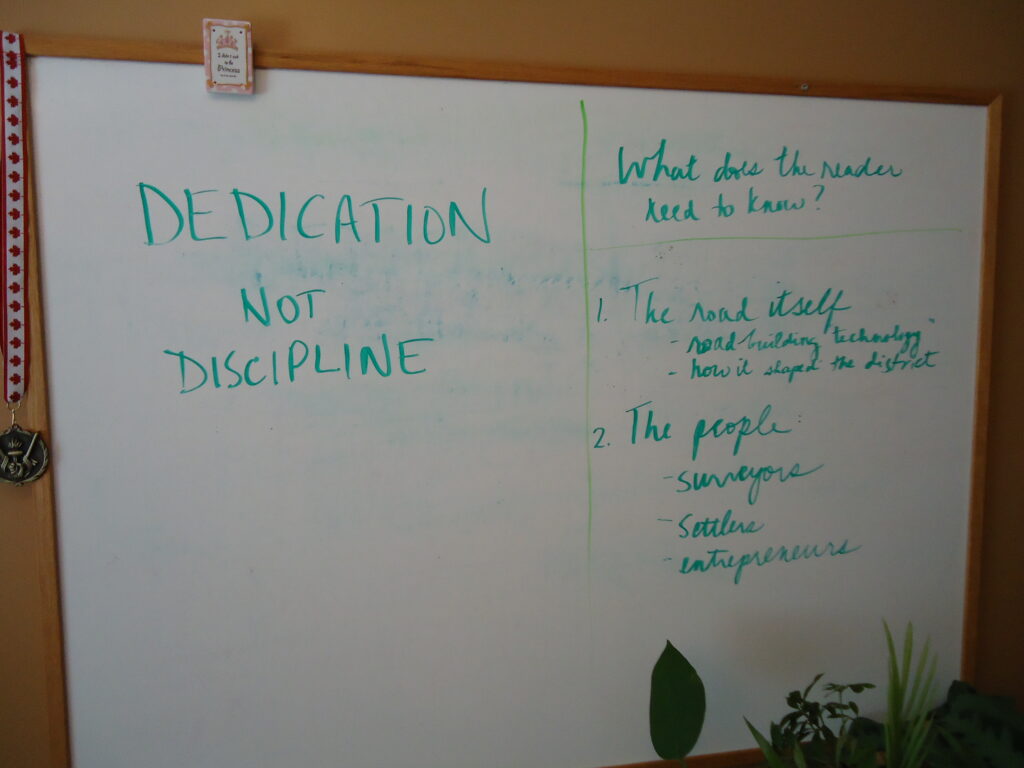I need a project plan. I know this because I was a project manager for 20 years. Plus, I’m more of a planner than a “seat-of-the-pantser” by nature. I also want to enjoy the process of writing this book, maintain momentum while keeping in balance all the other things I’m doing in life, and meet my deadlines.
So today I started planning from the top down, with a big picture and some stakes in the ground.
Here is my overall goal: To write this book in balance with all the other aspects of my life.
The balance thing is vitally important to me. I teach writing workshops, write this weekly blog and other non-fiction articles. I own a house and a cottage and have two young-adult children still at home and a husband who works out of town 10 days a month. Just to name a few of the balls I’ll be juggling, while I try to maintain momentum on this project.
Momentum is also really important. I’ve learned that you can lose a lot of time by going away from a writing project, because you have to re-orient yourself when you return to it before you can be productive again. It will be easy for me to work daily when hubby (Mr. Busy) is out of town. When he’s here, we tend to hang out together, or travel a bit, or go for long lunches. Maybe some changes are in store? Regardless, I want to manage my time so the writing is a pleasure, not a pressure.
This is my overall timetable: 1 year.
Sounds like a long time, doesn’t it? I think so too, sometimes, until I remind myself that research is like a kitchen renovation. To estimate the time it will take, you start with the longest possible time you can imagine. Then you double that, and you might be close.
There are two key elements in the story that I want to tell: The Muskoka Road itself and the people who walked or lived along the road.
I am fascinated by road-building “technology” and how it changed over the century I’m writing about. (Imagine being a contractor facing a wall of eighty-foot-high white pines with an axe in your hand, and maybe you can see why.) And I want to tell the stories of the surveyors, the settlers and the entrepreneurs who made and used the road.
I’m using the whiteboard in my office to help me stay anchored in what is really important:

Hey, I’ve just found out that “Clio” is the muse of history and writing! Whoo hoo – I have a muse! I’ll look for a picture of her to add to the white board.
I love these two ideas — balance and momentum. I think I am lacking in both :). I’m really looking forward on updates on both these issues, and descriptions on how you are making them both work.
In a future post, I’d like to hear your ideas on how your workspace helps with these two issues. Is it better to have a workspace set aside in a private place? Or is it better to have your laptop handy on the kitchen counter for jotting down notes? Do you carry a notebook with you everywhere, or do you only work in your set-aside block of time when you can sit at your quiet desk?
What works for you?
Funny you should ask! I’ve just changed my ‘workspace’ from a desktop to a laptop, in anticipation of doing research trips to Toronto and Muskoka. So that’s a brand new way of working – so far I like being portble. I do carry a notebook in my purse, and also find myself hunting for pieces of paper to jot down ideas that occur to me. I’ll try to keep track of myself and post about what I think works best for me.